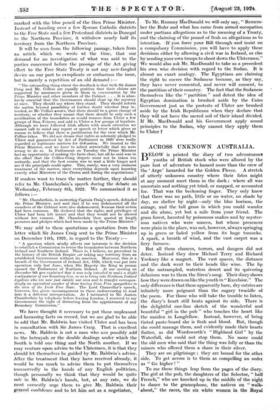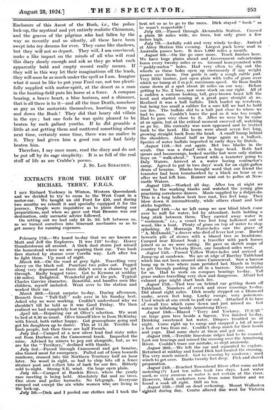ACROSS UNKNOWN AUSTRALIA.
BELOW is printed the 'diary of two adventurous youths of British stock who were allured by the pure lust of adventure to hazard more than the crew of the ' Argo' hazarded for the Golden Fleece. A stretch of utterly unknown country where their fates might at any moment meet them- in the dark -; • where all was uncertain and nothing yet tried, or mapped, or accounted for That was the beekoning finger. They only knew that there was no path, little or no water, no .shade by day, no shelter by night—only- the blue horizon, the mirage, and the tall grass in 'which you could wander and die alone, yet but a mile from your friend. The grass forest, haunted by poisonous snakes and by myster- ious natives who were unseen, but whose presences were plain in the place, was not, however, always springing up in green or faded yellow from its huge tussocks. A spark, a breath of wind, and the vast carpet was a fiery furnace.
But all these chances, terrors, and dangers did not deter. Instead they drew Michael Terry and Richard Yockney like a magnet. The vast spaces, the distance and the dark went to their heads like wine. The lip of the untrampled, waterless desert and its quivering delusions was to them the Siren's song. Their diary shows how they were drawn on like the youth in " Excelsior." The only difference is that these apparently bare, dry entries are infinitely more poignant than the sugary twaddle of the poem. For those who will take the trouble to listen, the diary's heart still beats against its side. There is the delightful one-line sketch of the wonderful and beautiful " girl in the pub" who touches the heart like the maiden in Longfellow. Instead, however, of being tinted paste-board she is flesh and blood. But, though she could manage them, and evidently made their hearts flutter, as did Wordsworth's "Highland Girl" by the. Waterfall, she could not- stop them. No more could the old men who said that the thing was folly or than the miners who Offered, them a share in their silver.
They are on pilgrirnage ; they are bound for the other side. To get across is to them as compelling an order as " Go higher ! "
To me these things leap from the pages of the diary. The girl at the pub, the daughters of the Selector, " hall French," who are knocked up in the Middle of the night to dance to the gramophone, the natives on " walk- about," the races,- the six white women in the Royal -Enclosure of this Ascot of the Bush, i.e., the police lock-up, the mystical and yet entirely realistic Chinaman, `and the graves of the pilgrims , who had fallen by the way so recently and so silently, all these have been swept into my dreams for ever. They came like shadows, but they will not- so depart. They will,- I am• convinced, make a like impact on the minds of all Who will read -this diary slowly enough' and ask as they go what each apparently bald- and empty record really means. If - they will in this way let their imaginations off the leash, they will soon be as much under the spell as I am. Imagine what it must be like to put your Ford car, not too plenti- fully supplied with motor-spirit, at the desert as a man in the hunting-field puts his horse at a fence. A compass bearing, a brave heart, a blue horizon, and a shimmer, that is all there is to it—and all the time Death, somehow as gay as the motorists themselves, hunting them up and down the Bush ! They did that hoary old villain in the eye ; but one feels he was quite pleased to be beaten by such gallant youths. If he did grumble a little at- not getting them and muttered something about next time, certainly some time, there was no malice in it. They had given him a good run and had fairly beaten him.
Therefore, I say once more, read the diary and do not be, put off by its sage simplicity. It is as full of the real stuff of life as are Crabbe's poems.
J. ST. LOE STRACIIEY.



































 Previous page
Previous page